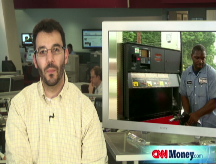Is $130 oil a bubble?
Some say no. They say unlike the tech and real estate bubbles, there's no overabundance of supply. Others say these high prices are not sustainable.

NEW YORK (CNNMoney.com) -- Oil prices have doubled in the past 12 months, surging nearly $8 a barrel in the past four days alone.
Big investment funds are putting money into oil futures as if Saudi Arabia's spigots will run dry tomorrow. At the same time, the supply of oil and the demand for it hasn't changed much in the last year.
So it raises the question: Is $130 oil nothing more than one big bubble?
The answer depends on who you ask.
"A bubble is where supply overwhelms demand," said Stephen Leeb, an investment manager who has authored two books on oil scarcity.
Leeb pointed to previous bubbles - like the tech bubble in the late 1990s where companies with zero earnings issued massive amounts of stock, and the real estate market a decade later where home builders went on a frenzy, overshooting the number of homes the market could absorb.
"But unless I'm missing something here, I don't see any massive increase in the supply of oil," he said.
Like many in the not-a-bubble camp, Leeb pointed to surging demand from places like China - some estimates see auto ownership there surging 30-fold in the next few decades - coupled with dwindling supplies as the main reasons behind pricey oil.
Thursday, the International Energy Agency gave advance warning that its previous forecast for supply and demand remaining in pleasant equilibrium over the next two decades was flawed. Its new projections, due in November, will say supplies may fall 10 percent short of demand, according to a report in the Wall Street Journal.
Leeb said Russia was already seeing a drop in production, and there's little evidence Saudi Arabia could increase production even if it wanted to.
"If the two biggest oil producers in the world can no longer increase production, that's a catastrophe, not a bubble," he said.
Others say there's no way $130 oil is justified.
"This thing has to turn around, it's insanity," said Peter Beutel, an oil analyst at the consultancy Cameron Hanover. "Ultimately we'll see a huge collapse in prices."
Beutel doesn't know when that collapse would come, but he predicts it will be within weeks or months, not years.
But he doesn't know just what might bring it about - perhaps the Federal Reserve increasing interest rates or a big drop in consumption as people worldwide can no longer afford to fuel their cars or heat their homes.
"If these prices stick, you may see whole neighborhoods where people abandon their homes," he said predicting that in the Northeast U.S. it will cost $5000 to heat a home unless prices fall.
Many analysts said supply and demand justifies expensive oil - maybe $90 or $100 a barrel - but $130 is just too much.
"To see something run this far and this fast, you see it leveraged by financial players," said Neal Dingmann, senior energy analyst at Dahlman Rose & Co., a New York-based energy investment boutique. "The direction is corect, the speed isn't."
Dingman said demand is slowing in the U.S., and the Chinese numbers are inflated because they assume the government will continue to subsidize fuel, which he feels they won't do.
Over the next five or ten years, he said it would be possible to see a return to $70 or $80 oil by gradually increasing supply - both in OPEC countries and non-OPEC countries like Brazil, as well as aggressive measures to limit demand like increasing fuel efficiency standards.
Robert Kaufmann, director of Boston University's Center for Energy and Environmental Studies, also says oil is overpriced by about $30.
He says current markets are adequately supplied, and traders are pricing in future predictions of surging demand.
"To me, that's a bubble," he said.
But Kaufmann still thinks oil should be priced at around $100. He says supplies just aren't growing, and the only way to bring prices down to the $100 range is to reduce consumption.
"Even when that bubble pops, you're not looking at $60, $70 oil," he said. ![]()



